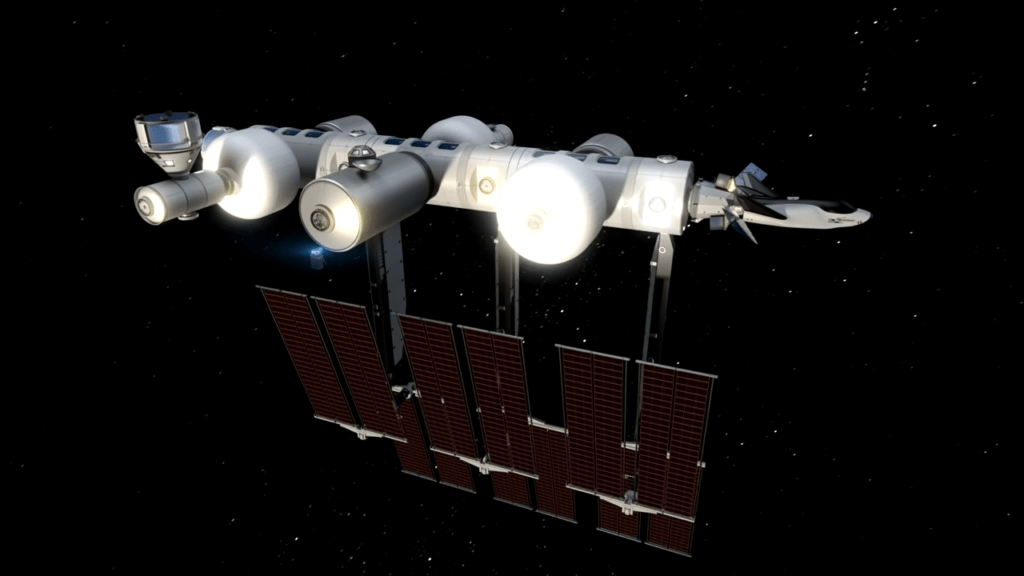
Jeff Bezos, possibly miffed at losing both his “richest person on Earth” title to Elon Musk and losing NASA’s Moon landing contract to Musk’s SpaceX, announced today that he’s building his own space station.
On Orbital Reef, Bezos’ Blue Origin space company will partner with other SpaceX competitors, including Sierra Space and Boeing. Boeing also saw some setbacks recently. Its Starliner spacecraft has been delayed indefinitely and NASA reassigned the astronauts who were planning to fly on it to SpaceX missions. Ouch.
According to the announcement, Orbital Reef will be built in low Earth orbit and will start operating “in the second half of this decade.”
It will offer “research, industrial, international, and commercial customers the cost competitive end-to-end services they need including space transportation and logistics, space habitation, equipment accommodation, and operations including onboard crew” as a “mixed use business park in space.”
Blue Origin will build the large-diameter core space station modules and utilities, as well as the transportation on the reusable, heavy-lift New Glenn launch system. New Glenn has been in development since 2016 and was originally slated to have its first launch in 2020. Then it was delayed to 2021, and then delayed again to 2022. One of the reason for the delays? It lost a Pentagon contract to SpaceX. Ouch.
Boeing will provide the science modules and handle station operations and maintenance engineering, as well as the Starliner crew spacecraft, assuming that it’s ever completed.

Sierra Space will provide a “large integrated flexible environment (LIFE) module” and the Dream Chaser spaceplane for crew and cargo transportation. The Dream Chaser is Sierra Space’s version of the space shuttle, and is designed to run on airport runways. It’s yet another space company that’s supposed to be already doing stuff in space, but isn’t. The Dream Chaser was originally scheduled to have its first flight to the International Space Station this year, but it’s been delayed to 2022. The company first developed the Dream Chaser as a vehicle to take NASA crew to the ISS but lost out the contract to… drum roll… SpaceX.
But all this competition should mean that prices for space travel will continue to drop and private companies will be able to send employees to space on work-related trips, opening up space travel to, well, not all of us, but those of us who work in relevant fields or who have enough money for a private ticket.
Blue Origin released a promotional video of the space station today, but the comments were overwhelmingly snarky.
“Amazing to see Blue Origin finally competing with Pixar,” wrote commenter Elmagar.
“This is like trying to run a marathon before you’ve learned to walk,” wrote commenter Benjamin.
“Cool concept! Keep working on it! Will love to see it! Do space stuff, don’t sue others haha,” wrote commenter TecnoDrone, in reference to Jeff Bezos’ high-profile lawsuits against NASA over the loss of contracts to SpaceX.
“The Falcon Heavy and in the future Starship will be able to assist you getting these heavy payloads into orbit,” wrote commenter DaS, referring to two SpaceX projects.
“Blue Origin really loves renders. Orbital Reef, Starliner, Dream Chaser and New Glenn. None of the hardware that appears in the video is operational. Good luck, I really would like you to succeed,” wrote commenter NexusAho.
Watch the full announcement video below.
MetaStellar editor and publisher Maria Korolov is a science fiction novelist, writing stories set in a future virtual world. And, during the day, she is an award-winning freelance technology journalist who covers artificial intelligence, cybersecurity and enterprise virtual reality. See her Amazon author page here and follow her on Twitter, Facebook, or LinkedIn, and check out her latest videos on the Maria Korolov YouTube channel. Email her at [email protected]. She is also the editor and publisher of Hypergrid Business, one of the top global sites covering virtual reality.

